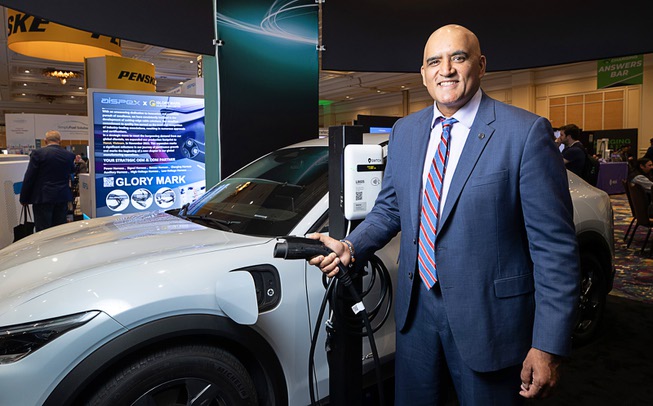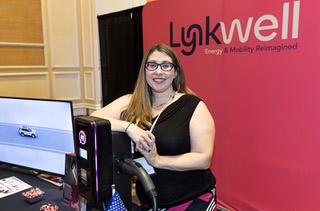
Federal Highway Administrator Shailen Bhatt poses by a Ford Mustang Mach-E electric vehicle in the SWTCH booth during the EV Charging Summit & Expo at the Mirage Thursday, March 21, 2024. SWTCH makes EV charger management software.
Monday, March 25, 2024 | 2 a.m.
Shailen Bhatt, federal highway administrator and a top official in the U.S. Department of Transportation, is emphasizing the importance of implementing an infrastructure for charging electric vehicles, an initiative he noted will require plenty of time.
“We have a century in this country of building infrastructure for the internal combustion engine,” he told the Sun late last week during the EV Charging Summit and Expo at the Mirage. “And so what we’ve got to do is quickly, safely and efficiently develop the infrastructure for EVs. And we’re doing that already.”
The summit took place on the Strip within days of the Environmental Protection Agency announcing new automobile emissions standards, which The Associated Press reported would limit tailpipe emissions with the aim of boosting EVs and making 56% of new vehicle sales electric by 2032.
Creating a reliable infrastructure for EV charging is essential to more people choosing to adopt EVs, said Kate Kruk, the director of community engagement for Lynkwell, a New York-based EV charging solutions company that had a booth on the floor of the expo. The event featured manufacturers and other stakeholders demonstrating new products to showcase the latest technology in charging electric vehicles.
“We know that we can do better with our carbon emissions, and transportation is one of the biggest problems with carbon emissions,” she said. “We can do better. EVs being part of the mix is going to reduce those carbon emissions in transportation, and it can be done.”
There’s 177,000 public EV chargers currently available, Bhatt said Thursday, and the Biden administration wants there to be 500,000 by the end of the decade. The U.S. will reach that goal by 2027, Bhatt said.
“It’s funny how technology evolves, and we’ll evolve along with it,” he said. “And we just want to make sure that the EV charging network is there when more people adopt them.”
Compared with other countries, the U.S. may not be keeping pace in the transition to EVs. Ten percent of all vehicle sales in the U.S. were EVs last year, Bhatt said, a far cry from the 30% in China.
And, he added, the European Union has also set aggressive targets around electrifying fleets.
“So we’re not just talking about selling EVs in America,” he said. “We’re talking about a critical industry for the United States that has global reach, and we want to make sure we are selling those vehicles just like we did in the 20th century — that we’re an exporter of these vehicles.”
David Ellis, vice president of engineering and product development for Dunamis Charge, a Detroit-based EV charging company, said the company’s goal is “EV for everyone,” especially as there’s a broader push for transitioning from internal combustion engines to EVs.
It’s going to be a multitrillion-dollar transition, he said, and Dunamis Charge’s goal is to make sure underrepresented populations get to be a part of it.
“So we have a community-based initiative,” Ellis said at the summit Thursday, “but we want to grow the product organically from the community, out to the state of Michigan, across the country and around the world.”
The 2021 Bipartisan Infrastructure Law designated $7.5 billion for the EV charging network, Bhatt said. That means determining standards for the network itself — for example, how many miles between charging stations or how much charge is available at each.
“We’re not building this,” he said. “It’s the private sector who’s going to build it using federal dollars. But another story that I don’t think is getting told as well is the billions of dollars of private-sector investment that are going in, as well as the jobs that are being created.
Bhatt described the importance of a positive EV charging experience for customers to that of going to a restaurant: If you have a bad experience, you’re probably not going to go back. In the same way, if you have an EV and find that you can’t always find a charger or that they don’t work, you’re less likely to recommend it to others.
“So that’s what we’re really focused on,” he said. “Building a network so you can go from coast to coast and within your city with an EV and it’d be a safe and efficient and effective trip for you.”
[email protected] / 702-990-8926 / @_katieann13_

